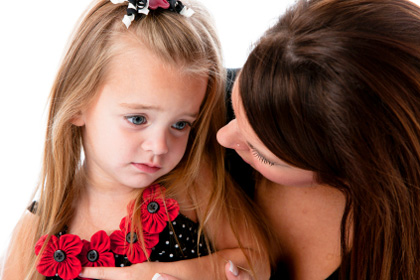 We all remember them — the remarks that our parents repeated ad nauseam throughout our childhood: “Wait until your father gets home!” “Because I said so!” “Wipe that look off your face!”
We all remember them — the remarks that our parents repeated ad nauseam throughout our childhood: “Wait until your father gets home!” “Because I said so!” “Wipe that look off your face!”
Let’s face it: These kinds of comments are still grating after all these years.
Now we’re the parents — a new, more enlightened generation with parenting books scattered across our coffee tables, instant access to mom blogs and unlimited advice streaming from every possible source. Surely we know better.
Not necessarily, says Nancy Buck, Ph.D., developmental psychologist and author of Peaceful Parenting. The truth is, we often repeat the very phrases we grew up with — and detested.
Here are a few golden oldies, along with some expert analysis and explanations that tell us why we should wipe these well-worn remarks from our repertoires.
“Why can’t you be more like your sister?”
You can’t avoid noticing, comparing and evaluating children — we just do,” says Buck. But we should be cautious about how we verbalize these observations, particularly if one child is easier to parent than another. “The kids will feel they have to live up to that comparison,” she says. “The perfect child has to maintain her position. The challenging one — she’ll prove you right, too.”
Lauren Leiker, a Seattle-based Parent Coaching Institute (PCI) Certified Parent Coach, offers this suggestion: “It’s OK to say, ‘Look how hard your brother worked on that’ — but leave off the part where you say, ‘Why can’t you do that?’”
“You have to learn to take a joke.”
Tracy Leins, Redmond mom of two, loves her husband Billy’s sense of humor. His jokes often fall flat, however, with their 6-year-old daughter, Whitney. “Billy can be sarcastic, and Whitney is sensitive,” says Leins.
What seems like lighthearted teasing can bring their daughter to tears. While it’s natural to want to share our own brand of humor with our children, jokes are complex, says Buck, and this age group may not be cognitively ready to understand them. When our humor flops, she recommends we simply say: “I need to learn to tell a joke that you find funny.”
“Stop it!”
Local mommy blogger Kathryn Thompson admits to turning to this familiar phrase regularly, despite its ineffectiveness. “Rarely has anything stopped simply because I declared it to be so,” she says.
So what should we say if we want our kids to just, well, stop it? Although it may be blatantly obvious to us what behavior we’re talking about, we’ll probably need to be more specific. “Children need clarity,” says Leiker. “Stop what? For example, we might say, ‘Wow, you guys have been bickering all morning. I’m finding it hard to concentrate. Can we find a solution?’”
“Here, let me help you with that.”
When our children are learning to walk, we intuitively know that they need to fall again and again before they learn. “As kids get older, we forget that they need time and space to practice,” says Buck.
When we take over like this, she says, it can be discouraging. “Kids are always motivated to learn, but they will give up if they think that they’re not good enough or fast enough.” Instead, she suggests that parents wait until their child asks for help before stepping in. Rather than constantly offering feedback, she advises us to sometimes let them self-evaluate by asking, “How do you think you did?”
 “Do your best.”
“Do your best.”
This one works well for older children, but to young kids, it doesn’t make a lot of sense, says Leiker. At this age, most children really aren’t trying to achieve a personal best. “When 3- or 4-year-olds play soccer or do ballet, they are simply there to have fun and try something new,” she says.
Leins, the Redmond mom, admits she feels pressured to make sure her kids succeed at a young age. “There is an attitude today that if they’re going to excel at something, they’ve got to start working on it right away. We don’t want them to fall behind.”
Leiker suggests that instead of telling very young children to do their best, we can say, “Go out there and have fun!”
Teaching kids by example
We are often vaguely aware that our standby phrases aren’t constructive. Stress is a big factor in this disconnect, says Buck. “We say these things when it’s crunch time. You’re on the phone, and your kids are interrupting. It just comes out.”
When Thompson realizes she’s committed a verbal gaffe with her kids, she tries not to be too hard on herself. Instead, she uses it as an opportunity to model ways to cope with mistakes.
“We teach our kids this by example,” she says. “Do we apologize? Do we continually try to be better? Showing our children a person striving for perfection is a far more compelling example than showing them a person who thinks she’s already arrived.”
Laura Mackenzie is a freelance writer. She lives in Redmond with her husband and two children, ages 7 and 11.
4 tips for improving communication with your child
Reconnect
An offhand comment in a moment of stress might send a different message to our kids than we intend. By setting aside downtime regularly for our family, we can use it to talk with our children when we’re not rushed. Reconnecting with our kids like this enables us to communicate in a more intentional way.
Take care of yourself
Leave space in the day for self-care. When we are overwhelmed, we have a tendency to react, instead of respond. The same things that make it difficult for our kids to self-regulate affect us, too. Getting enough sleep, eating right, and carving out some alone time can make a big difference in our parenting.
Ask questions
Questions are often more powerful than comments. Sometimes as parents, we feel that it’s our job to dispense continual feedback and instruction. When we feel an unhelpful remark coming on, ask our child how they feel about the situation. We can’t say the wrong thing when we are just listening.
Acknowledge mistakes
We can’t be reflective in everything we say to our kids. There are times when we’re on autopilot, and we shouldn’t berate ourselves when we slip up. What’s most important is that we acknowledge our mistake. An apology goes a long way.
Source: Lauren Leiker, M.Ed., PCI Certified Parent Coach, ParentingAware
This article was originally published in 2012 and reposted in 2015.









